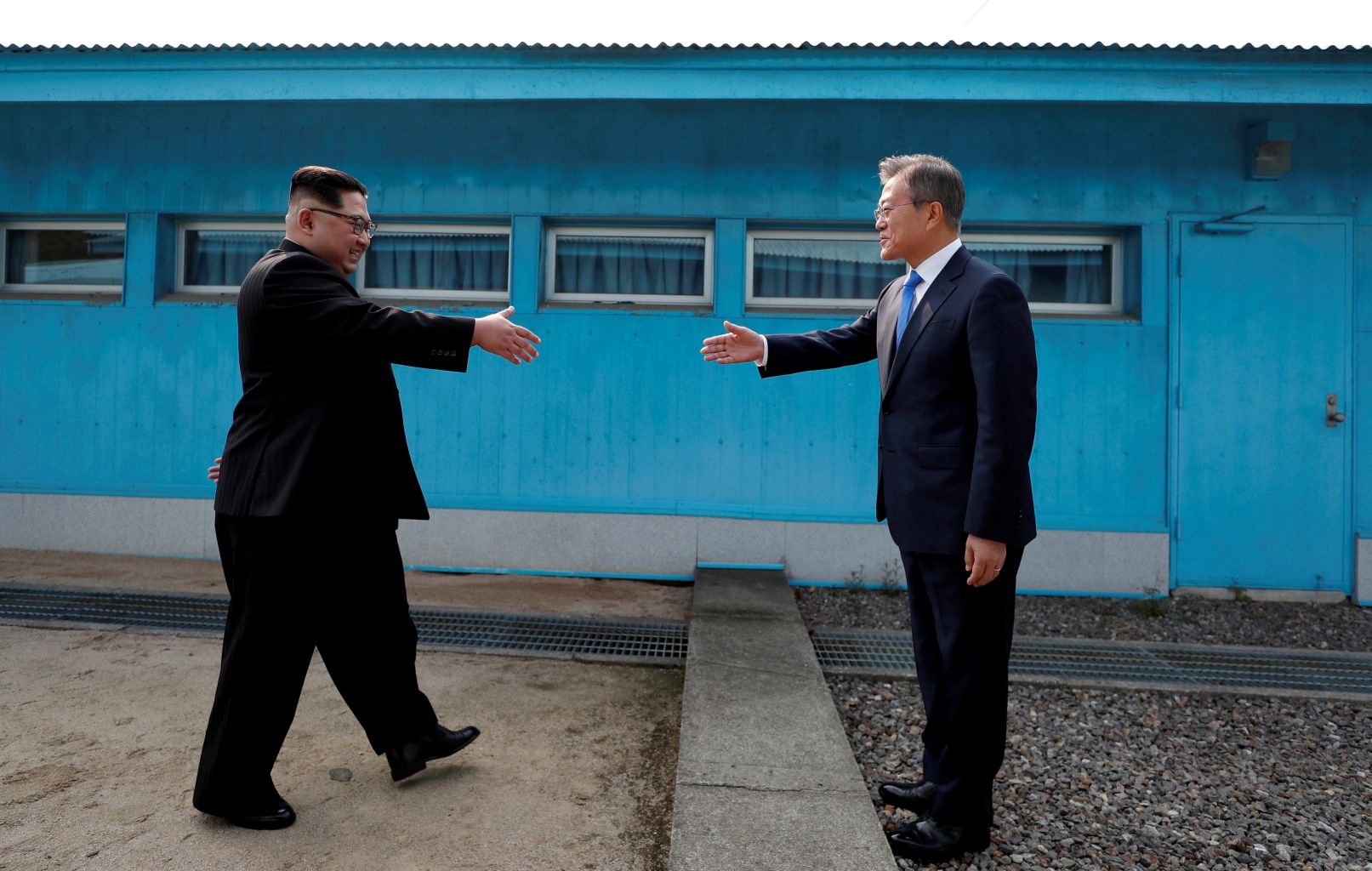Nice pan-Korea atmospherics, but the devil is in the details
Sign up now: Get insights on Asia's fast-moving developments

PHOTO: REUTERS
WASHINGTON - Friday's (April 27) summit at Panmunjom between South Korean President Moon Jae In and North Korean leader Kim Jong Un was rich with the colour of pan-Korean symbolism and a potentially transformational shift on the peninsula.
But the devil remains in the details. Much of the language in the Panmunjom Declaration has been seen before. The idea of "denuclearisation" of the peninsula can mean different things. It remains, analysts say, a remote possibility that North Korea will completely give up it nuclear weapons.
"As a former ambassador to the Republic of Korea, I could not help but to be moved by the images and warm atmospherics during the Summit," Mr Alexander Vershbow, a Distinguished Fellow at the Scowcroft Centre for Strategy and Security, wrote in an emailed comment.
"But it remains to be seen what Kim Jong Un's commitment to denuclearisation means in concrete terms," he cautioned.
Dr Victor Cha, senior adviser and Korea chair at the Centre for Strategic and International Studies (CSIS), wrote in a commentary that he gave the summit an "A" for optics and a "B+" for substance.
But he added: "What is missing from this summit is any clearer indication of where Kim stands on denuclearisation and whether he is willing to give his nuclear weapons up this time, or whether he is interested in temporarily 'renting out' a freeze in return for sanctions relief, interim energy assistance, and reduced pressure."
Certainly, many Korea watchers agree that there is nevertheless grounds for optimism.
The International Crisis Group's Christopher Green wrote: "Today's symbolically important inter-Korean meeting makes the meeting between US President Donald Trump and Kim Jong Un all the more likely. And the news that Moon Jae In is to visit Pyongyang in the autumn implies a very welcome intention to continue moving in a positive direction."
But Korea watchers seldom fail to recall, for instance, the June 2000 cover of TIME magazine showing Mr Kim Dae Jung, then-president of the Republic of Korea, and Mr Kim Jong Un's father Kim Jong Il cheek-to-cheek at their meeting that month, with a big red heart symbol stamped on it.
Dr Sung-Yoon Lee, Professor in Korean Studies at The Fletcher School of Law and Diplomacy at Tufts University in Boston, warned against "empty theatrics".
"The optics of the wave of inter-Korean reconciliation are gripping and it will be very hard to go against this new reality and enforce sanctions against North Korea," he told The Straits Times.
"I cannot rule out that things might be better this time around, but all evidence points to the contrary," he added.
"It's hard to imagine that after having come so close to becoming a credible nuclear ICBM threat to the US, that Kim would have a change of heart and be amenable to giving up all that his grandfather and father so assiduously developed and he has put so much effort into."
"All Kim Jong Un has said so far is he won't test any missiles for the time being and he is willing to talk about denuclearisation. He hasn't made any substantive concession, but he has changed the dynamics, and now he comes across as a reasonable global statesman with whom we can do business. And doing business, returning to nuclear negotiations, always entails concessions, money, goodies, for the Kim family."
"South Korea is in the driver's seat," Dr Balbina Hwang, visiting professor at Georgetown University told CNN. What the two Koreas were showing by stepping both ways over the border line, was that "nobody else is in control, the two Koreas are seizing the process and are going to drive it."
Abraham Denmark, director of the Asia Programme at the Wilson Centre in Washington, tweeted that splitting South Korea and the US was an obvious strategy for North Korea, and if Mr Kim sensed that one side was willing to go further than the other, he would exploit it.
"The North-South dynamic is moving ahead with a lot of momentum - the US can't be caught flat footed," he cautioned.
"Critically, Washington and Seoul must stay shoulder-to-shoulder every step of the way. Any indication of disagreement would give Kim a major opportunity to undermine the alliance. Careful messaging and deft alliance management is more critical than ever."
President Donald Trump, in brief remarks to reporters on his own planned summit with Mr Kim, said: "We will be setting up a meeting very shortly. Hopefully, we are going to have great success... This is going to be a great thing for the world."
Asked if the North Korean leader might be playing games, he said : "I don't think he's playing."
"I don't think he's ever had this enthusiasm for... wanting to make a deal," he said.
"I agree, the United States has been played beautifully like a fiddle because you had a different kind of leader. We're not going to be played, okay. We're going to hopefully make a deal."
But he still reiterated that in his upcoming summit, if no solution was in sight, "We will leave the room."


